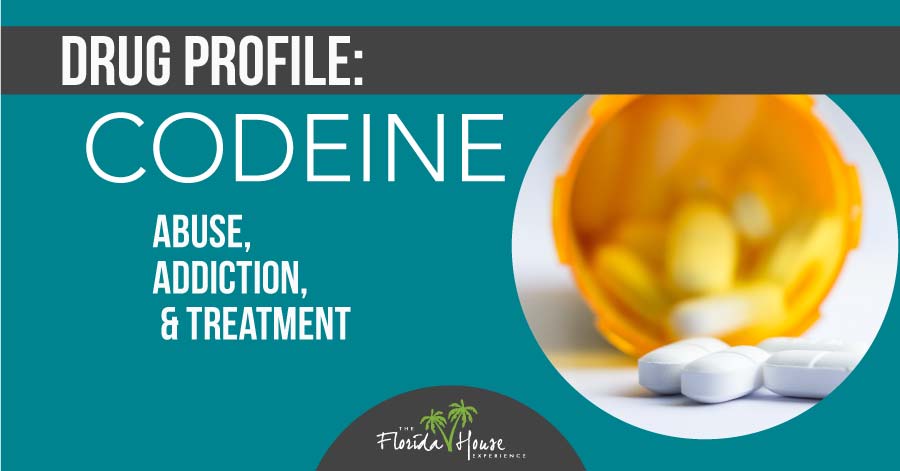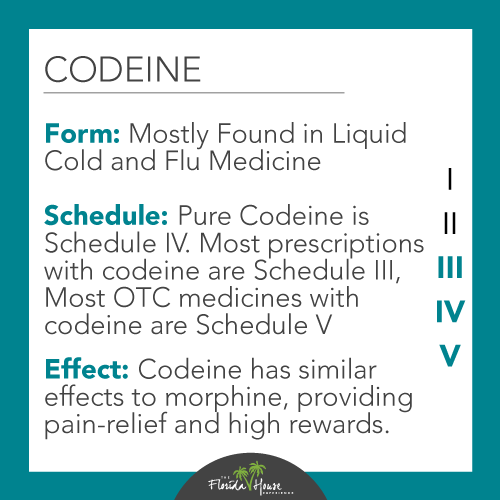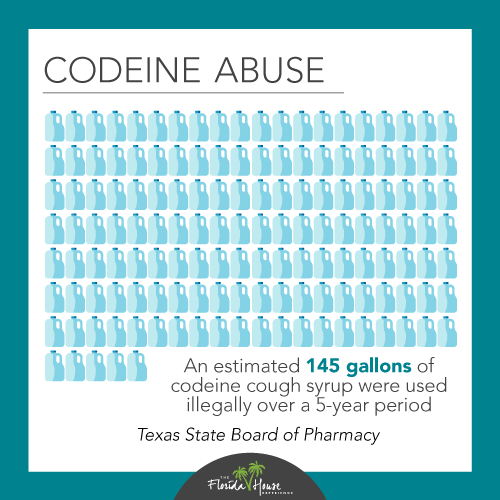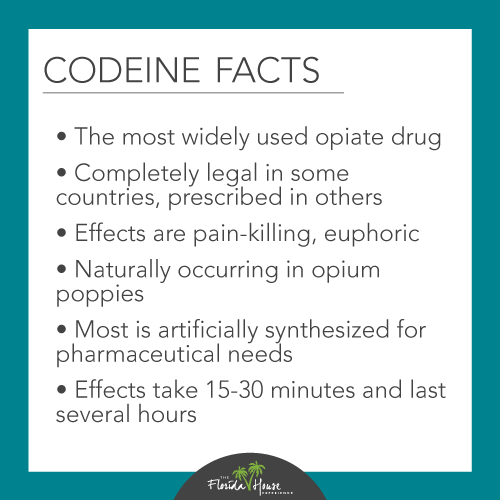
When experts and resources within the addiction treatment community talk about opiate addiction, a few culprits come to mind: fentanyl, heroin, and prescription opioid painkillers. An opiate that is rarely mentioned as a threat to the public health as much as its peers is one that we don’t typically consider to be in the same family: codeine.
Codeine is an opiate, however, and when abused, can be as dangerous as its peers in the same category of drugs. Here, we’ll talk about what codeine is, how it’s abused, and the dangers of prolonged codeine abuse.
What Is Codeine?
 Most commonly found in liquid cold and flu medications, codeine is a narcotic derived from morphine and opium, similar to heroin and other opiates. Codeine comes in a variety of forms, which explains its somewhat confusing designation on the FDA’s Controlled Substances Act (CSA) schedule. Pure codeine is a Schedule II drug, along with some other opiates including fentanyl, the leading cause of overdose deaths in the United States as of 2016.
Most commonly found in liquid cold and flu medications, codeine is a narcotic derived from morphine and opium, similar to heroin and other opiates. Codeine comes in a variety of forms, which explains its somewhat confusing designation on the FDA’s Controlled Substances Act (CSA) schedule. Pure codeine is a Schedule II drug, along with some other opiates including fentanyl, the leading cause of overdose deaths in the United States as of 2016.
However, pure codeine is very rare. It’s not a substance with a large potential for amateur manufacturing, so most of the codeine on the market comes in prescription and OTC cold medicines.
Prescribing practices vary between states, but most prescription medicines containing codeine are classified as Schedule III because they contain less than 90 mg of codeine per dosage unit. Most OTC medicines containing codeine are considered “safe” and placed in Schedule V.
The CSA is inherently flawed. It provides decent guidelines for the danger of using a drug, but not the danger of mixing drugs. Mixing is commonly observed in many of the cases that lead to overdose death and addiction.
How Does Codeine Effect the User
So, why is codeine ranked high in abuse potential? Because when it’s broken down by the body, it has a similar effect to every other opiate. The substance is broken down into it’s simplest form — resembling and providing similar effects to morphine.
This means that most users feel pleasure when using the drug, rewiring the reward centers of the brain and often leading to long-term abuse and addiction.
How Is Codeine Abused?
 This is the area in which codeine’s danger is enhanced. It’s true that the potential for overdose and addiction of codeine alone is less than other opiates, and it’s true that when used by itself, the effects aren’t as strong. In practice, it’s every bit as dangerous as its cousins.
This is the area in which codeine’s danger is enhanced. It’s true that the potential for overdose and addiction of codeine alone is less than other opiates, and it’s true that when used by itself, the effects aren’t as strong. In practice, it’s every bit as dangerous as its cousins.
You may have heard certain terms mentioned in music or other mediums of pop culture: Lean, purple drank, sizzurp, and other names, most common among rap artists in the United States. These terms are referring to a beverage made from mixing codeine cough syrup — usually, grape, as the slang monikers suggest — with vodka and sprite, or some other combinations of soda and alcohol. The drink has no standard recipe, so in some cases, alcohol is swapped out (or paired) with other substances like promethazine, Xanax, Jolly Ranchers, and other substances.
It should be noted that today, lean is often made with cough syrup containing Dextromethorphan (DXM), a common ingredient in OTC cold medicines, which are easier to acquire.
Why is mixing alcohol and cold medicine popular? Mixing all opiates is popular because the two substances in the mix amplify each other’s effects. Opiates release dopamine by binding to opioid receptors in the brain. Alcohol produces the same effect by affecting GABA receptors. This way, the user can amplify the effect of both drugs because the pathways they attack aren’t competing with each other.
Codeine as a Gateway Substance
There are cases in which people get into the habit of using codeine cough medicine to dissociate, without consuming “lean”. Because codeine has a weaker effect than other opiates, users often build up a tolerance for codeine. This leads them to seek a more rewarding high and experimenting with more traditionally “dangerous” substances.
Codeine Overdoses
 There are some well-documented cases of codeine overdoses. Because “lean” is popular among celebrities, some overdoses or “episodes” influenced by codeine abuse have been very public.
There are some well-documented cases of codeine overdoses. Because “lean” is popular among celebrities, some overdoses or “episodes” influenced by codeine abuse have been very public.
Maybe the most well-known case in the past decade is the rapper Lil’ Wayne. According to a Daily Beast article published in 2016, the rapper whose real name is Michael Carter Jr., admitted multiple times to suffering from dependence on codeine. After trying and failing to quit multiple times, Carter Jr. actually had several seizures, which medical experts credit to his habitual consumption of this cocktail.
Carter Jr. is lucky to not go in the same tragic way as DJ Screw, an influential rapper in Houston in the late nineties. Credited as one of the earliest pioneers of creating “lean” with codeine cough syrup, DJ Screw died of an overdose on the drug at the age of 29.
Other cases aren’t as public, but still scary for those involved and their loved ones. One case involves a New York resident named Joe Gormon who mixed codeine with Sprite while also taking Xanax, a powerful benzodiazepine. After being found unconscious, Joe was rushed to a Staten Island hospital where he received treatment for an overdose.
Addiction to Codeine
Codeine abuse can become an addiction, even if medicine containing codeine is the only substance involved. Addiction resembles the same condition when observed as a result of the abuse of many other opiate pain relievers. Addicts are unable to function without their drug of choice, and often, the addiction manifests itself physically.
This means withdrawal and treatment is similar to other opiates as well, which is a good thing considering the success in certain therapies to limit the symptoms of withdrawal and successfully treat opioid addiction.
The process of comprehensive treatment for codeine addiction begins with medically assisted detox, after which therapeutic treatments, often in a residential capacity. The industry standard to treat opioid addiction is with medication-assisted treatment, using one of a few drugs, including but not limited to Suboxone® and Vivitrol.
To learn more about the process of recovering from opiate addiction, contact the experts with a wide view on the addiction treatment industry. FHE Health is a South Florida rehab facility that understands what works when treating addiction in a way that meets the unique needs of each and every one of the patients we treat. Call today for more.






